Living Well with Multiple Sclerosis
Welcome to Living Well with MS, the podcast from the Overcoming MS charity. In each episode, your host Geoff Allix explores a different aspect of the Overcoming MS Program in greater depth by talking with experts and people with MS about health lifestyle changes. New episodes are published on Wednesdays and feature interviews with scientists, neurologists, fitness specialists, diet experts, stress reduction professionals. The podcast also features inspirational, real-life stories from people with multiple sclerosis following the Overcoming MS program, about the challenges and victories of managing symptoms through lifestyle modification.
Episodes
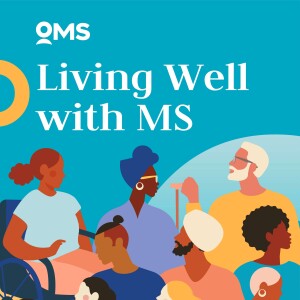
Wednesday Jun 14, 2023
Wednesday Jun 14, 2023
Welcome to Living Well with MS. In this episode we are delighted to welcome Associate Professor Sandra Neate as our guest! Sandra is from the Neuroepidemiology Unit (NEU) at the University of Melbourne where she researches lifestyle modification and diet quality for people with MS. This webinar was recorded in September 2022 as part of our 'Finding Hope with Overcoming MS - 10th-anniversary edition' webinar series. You can watch the whole webinar here or the podcast highlights on YouTube here. Keep reading for the key episode takeaways and bio. Make sure you sign up to our newsletter to hear our latest tips and news about living a full and happy life with MS. And if you’re new to Overcoming MS, visit our introductory page to find out more about how we support people with MS. Selected Key Takeaways: Evidence shows there are benefits to regular meditation (28:57) “The most compelling result was that meditation resulted in reduced depression, and increased feelings of mastery. It's about the feeling that one's life is under one's own control and not controlled by external forces, feelings of empowerment, that sort of thing. The interesting finding was that those who were meditating even as little as once weekly for 20 minutes were still experiencing a benefit.” Sticking to the Overcoming MS diet can lead to improved health outcomes (21:34) “We've conducted two studies that have looked at sticking with an MS-specific diet. Now some of these are named MS diets, like the Swank diet, the Overcoming MS diet, the Wahls style, etc. One of our studies looked at whether following an MS-specific diet led to improved health outcomes. It found that persistent adherence to the Overcoming MS diet led to lower fatigue, disability and depression than both non-adherence and ceased adherence to the diet. So, your ability to stick with the diet is a very important thing.” The Neuroepidemiology Unit wants to provide the tools for people with MS to take control of their health (45:15) “We're trying to build a picture of what lifestyle modification can do in MS. By doing that we hope to help people with MS find confidence and empowerment through the knowledge they've gained. We hope to provide people with MS with the tools to self-manage because the principles are fairly simple. The practicalities may not be so simple, but the tools are there. We hope that people will live with hope, based on the evidence that we've provided.” Related Links: Watch the original webinar here Read the Overcoming MS Handbook: Roadmap to Good Health Listen to previous episodes with Sandra Season 3E36 NEU - What's on the research horizon Season 4E47 Hello 2022, Hello OMS Handbook Find out more about the NEU here New to Overcoming MS? visit our introductory page Visit our website Follow us on social media: Facebook Instagram Twitter YouTube Pinterest Don’t miss out: Subscribe to this podcast and never miss an episode. Listen to our archive of Living Well with MS here. If you like Living Well with MS, please leave a 5-star review. Feel free to share your comments and suggestions for future guests and episode topics by emailing podcast@overcomingms.org. Make sure you sign up to our newsletter to hear our latest tips and news about living a full and happy life with MS. If you enjoy this podcast and want to support the ongoing work of Overcoming MS, you can leave a donation here. Associate Professor Sandra Neate’s bio: Sandra’s career Associate Professor Sandra Neate is a clinician researcher who is the head of the Neuroepidemiology Unit (NEU) within the Melbourne School of Population and Global Health at the University of Melbourne in Australia. NEU research The NEU researches lifestyle-related risk factors in MS and health outcomes and the experiences of people who adopt lifestyle modification. The NEU is also developing and researching novel ways to deliver evidence-based information about lifestyle modification to people with MS, including online modalities. Sandra's personal research interest is in talking with people with MS and their families regarding the experiences of lifestyle modification.
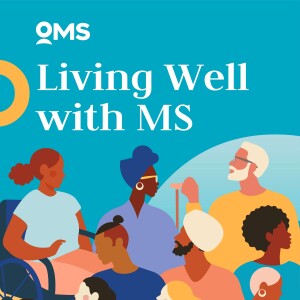
Wednesday Jun 07, 2023
Wednesday Jun 07, 2023
Welcome to Living Well with MS, where we are pleased to welcome the Ambassador of the Overcoming MS Toronto Circle, Jesse Mirsky, as our guest! He chats to Geoff about how he felt after being diagnosed with MS, how he adapted to the Overcoming MS Program and why he became an Ambassador. Watch this episode on YouTube here. Keep reading for the key episode takeaways and Jesse’s bio. Questions and Timestamps: 00:50 Could you introduce yourself and tell us a little bit about where you live and what you do? 02:03 Can you tell us a bit about your MS journey and how you found out about Overcoming MS? 02:57 Why did Overcoming MS resonate as something to follow? 03:39 Has your perspective changed at all since diagnosis and finding Overcoming MS? 06:51 How did you find quitting smoking? Did you just stop instantly? And what would be your tips for someone who is a smoker and has MS? 09:50 What aspects of the Overcoming MS Program do you like most and have found most straightforward to implement? 12:45 You're the ambassador for the Toronto area. What's the value of being the ambassador for Overcoming MS? 15:03 Could you tell us a bit about your volunteer work with MS Canada? 19:37 If you were to give advice to yourself as a newly diagnosed person, what would that advice be? Selected Key Takeaways: The Overcoming MS Program empowers and informs people to make positive lifestyle changes 03:02 “[Professor] Jelinek's voice really spoke to me like I'm a relatively intelligent adult. It was the first time I heard ideas like ‘follow this very healthy evidence-based lifestyle program, and still take your DMT with your neurologist’s guidance, if that's a good fit for you.’ It was also the first time I felt like I had a say in my health, in my approach to my MS.” Grieving your former self can be an important step in making healthy changes 04:02 “I discovered the concept of grieving for the loss of my former self and finding the new me. That concept really resonated with me. In a lot of ways, I actually saw it as a really positive thing. Through that I embraced dietary, exercise and mindfulness initiatives fully. Through the process of discovering who this new me is, I made a lot of decisions to cut out toxic elements from my life, whether that's food and lifestyle related, people, or even something like social media. Overcoming MS was a major factor in helping all this.” Find the method that works for you to quit smoking 07:40 “I really struggled for about two years with smoking. Whereas [with] my drinking, getting that under control was actually almost easy and immediate in comparison. It feels like I tried everything to quit before I got a handle on it, which included things like tracking every time I smoked, and then trying to reduce the number of times each day, going cold turkey, reading about how horrible smoking is for your health, the scare tactics, etc. All those things. At the end of the day, I actually found Allen Carr's ‘Easy Way to Stop Smoking.’ That book really worked for me.” Want to learn more about living a full and happy life with multiple sclerosis? Sign up to our newsletter to hear our latest tips. More info and helpful links: Join an Overcoming MS Circle Listen back to our episode about Mathew Embry and the Best Bet diet Read Allen Carr’s Easy Way to Stop Smoking Live in Canada? Get more information about MS Canada support groups New to Overcoming MS? visit our introductory page Visit our website Follow us on social media: Facebook Instagram Twitter YouTube Pinterest Don’t miss out: Subscribe to this podcast and never miss an episode. Listen to our archive of Living Well with MS here. If you like Living Well with MS, please leave a 5-star review. Feel free to share your comments and suggestions for future guests and episode topics by emailing podcast@overcomingms.org. Make sure you sign up to our newsletter to hear our latest tips and news about living a full and happy life with MS. If you enjoy this podcast and want to support the ongoing work of Overcoming MS, you can leave a donation here. Jesse’s Bio:Jesse lives in Toronto, Ontario. He works for a Toronto-based tech startup focused on accessible digital products. Jesse’s volunteer work Jesse volunteers for Overcoming MS and MS Canada, Canada’s national MS-focused charity. As an ambassador with Overcoming MS, he facilitates the Greater Toronto Area online Circle support group. He is also a member of the Overcoming MS Communications Advisory Group. At MS Canada, he facilitates a support group for people who are newly diagnosed with the disease and gets to work with the charity’s education team on webinars and events, too. Discovering Overcoming MS A major turning point in coming to terms with his diagnosis was discovering Overcoming MS. The program has helped him to change his perspective, offered him access to a community of others who can relate and has reinforced a positive outlook that he can always come back to for inspiration and hope.
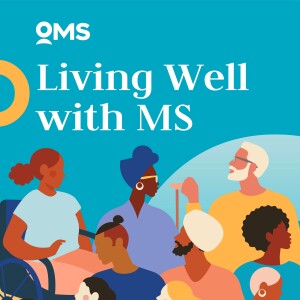
Wednesday May 24, 2023
Wednesday May 24, 2023
Welcome to Living Well with MS, where we are pleased to welcome Molly Meng as our guest! Molly has been following the Overcoming MS Program since 2020 and is an artist with a passion for storytelling. She chats to Geoff about how she adapted to the Overcoming MS Program, how she has found ways to manage stress and how her MS diagnosis has led her to build connections with others living with MS. Watch this episode on our YouTube here. Keep reading for the key episode takeaways and Molly's bio. Make sure you sign up to our newsletter to hear our latest tips and news about living a full and happy life with MS. And if you’re new to Overcoming MS, visit our introductory page to find out more about how we support people with MS. World MS Day Tuesday 30th May is World MS Day, this year we're joining charities all over the world to share stories of connection using #MSConnections. Join the global campaign to make a difference to people with MS here: overcomingms.org/worldmsday Key Takeaways: Understanding how diet affects your health can help you make changes “I was such a dairy hound. I was not only raised on dairy, but if you asked me one thing that I love having in my life ever it was dairy cream. Didn't have to be ice cream, just cream, milk, butter. I loved dairy so much that I thought, ’how will I ever give it up?’ But the moment I read [the research on] the Overcoming MS website, I walked into my kitchen, and I just emptied out my fridge.” Following the Overcoming MS diet can get you excited to try new flavours and food combinations “[Following the Overcoming MS Program] has changed my excitement for food. I thought I was a foodie before, but now I wake up in the morning [and] I think what kind of flavours do I want to put together? Do I want salty and sweet? What can I use to get to that flavour? Can I use dates? Can I actually use a little tahini and dill? I just love it. I now cook and make things as a relaxing hobby.” Mindful walking can be a form of stress-reduction “When I'm on my dog walk, I don't take a phone. I don't have conversations. On the dog walk, I just find that I'm really mindful and I'm noticing the robins and the flowers. My whole body tends to lower its adrenaline and by the time I get home from that walk, I don't find a lot of things to be stressed about.” Related Links: Molly’s Website: https://www.mollycmeng.com/#/ Molly’s Instagram: https://www.instagram.com/molly_c_meng/ New to the program? Check out our quick guide to getting started: https://overcomingms.org/new-to-oms Overcoming MS Recipes: https://overcomingms.org/resources/recipes New to Overcoming MS? visit our introductory page Find out more about Overcoming MS here: https://overcomingms.org/ Follow us: Facebook Instagram Twitter YouTube Pinterest Don’t miss out: Subscribe to this podcast and never miss an episode. Listen to our archive of Living Well with MS here. If you like Living Well with MS, please leave a 5-star review. Feel free to share your comments and suggestions for future guests and episode topics by emailing podcast@overcomingms.org. Make sure you sign up to our newsletter to hear our latest tips and news about living a full and happy life with MS. If you enjoy this podcast and want to support the ongoing work of Overcoming MS, you can make a donation here. Bio:Molly’s personal life and MS diagnosis Molly Meng is a Los Angeles, California native who recently moved with her husband to Portsmouth, New Hampshire. She was diagnosed with MS in August 2020 and started following the Overcoming MS program that same month. The move from CA to NH was largely influenced by this diagnosis, in an effort to slow down and live deeper in nature. Molly’s career as an artist Molly is an artist, working with ephemera, vintage photos and textiles, who also teaches creative workshops throughout the year. She loves being on stage performing stand-up comedy, and storytelling. Molly finds enjoyment and ease in seeking out new people and speaking with strangers. Her motto that “strangers are just friends you haven't met yet” has led her to meet a wide variety of others who are living well with MS.
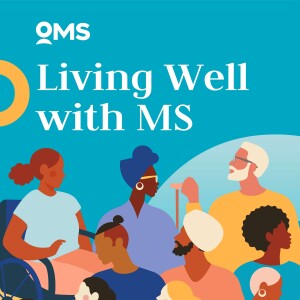
Wednesday May 17, 2023
Wednesday May 17, 2023
Welcome to Living Well with MS. In this episode we are sharing the highlights from our ‘Mindfulness and Meditation with Overcoming MS’ webinar with Overcoming MS Facilitator Dr Phil Startin. Phil discusses ways to make mindfulness and meditation part of your daily life. This popular webinar was recorded on 17 April 2022 as part of our Finding Hope with Overcoming MS - 10th anniversary edition webinar series. Keep reading for the key episode takeaways and bio. Make sure you sign up to our newsletter to hear our latest tips and news about living a full and happy life with MS. And if you’re new to Overcoming MS, visit our introductory page to find out more about how we support people with MS. Selected Key Takeaways: Starting a new meditation habit can be difficult 3:17 “When we run Overcoming MS retreats or events, often one of the first questions we ask the group is ‘which steps in Overcoming MS do you find the hardest to adopt?’ And it's always meditation. If you do struggle with meditation, and getting a practice going, you're definitely not alone. Of all the different steps within the Overcoming MS program to actually adopt about 34% of us really, really struggle with that.” Give yourself permission to take time out to meditate 6:28 “We’re almost addicted to activity at times. Activity has become a measure of success, which just seems to be crazy. We're almost ‘not allowed’ to sit and do nothing. There's a phrase I really like, ‘we’re not human beings, we're human doings.’ We just spend all our time doing things. But perhaps the biggest reason why we don't meditate, or why we stop meditating is we just don't give ourselves permission.” Keep yourself accountable for your meditation practice 10:34 “At the end of the day, you need to be accountable for actually getting yourself to start meditating. I recommend that you journal, and record every time you meditate: what was that meditation experience like for you? I did for a number of years. And I found it extremely helpful to be able to look back over my experiences, and to see how it worked. It's a great way of learning about the practice. Give yourself a little reward now and again, as well. If you manage, let's say, a week of meditating within no gaps, then reward yourself for a month of meditating.” Related Links: Watch the original webinar here Overcoming MS Meditation resources Other Living Well with MS episodes on mindfulness S2 Episode 24 Top hacks for getting into a meditation habit with Alison Potts S1 Episode 7: Building a Daily Meditation Practice with Craig Hassed Sign up for the next live webinar. Don’t miss out: Subscribe to this podcast and never miss an episode. You can catch any episode of Living Well with MS here or on your favourite podcast listening app. If you like Living Well with MS, please leave a 5-star review on Apple Podcasts or wherever you tune into the show. Feel free to share your comments and suggestions for future guests and episode topics by emailing podcast@overcomingms.org. Make sure you sign up to our newsletter to hear our latest tips and news about living a full and happy life with MS. If you enjoy this podcast and want to support the ongoing work of Overcoming MS, you can leave a donation here. Dr. Phil Startin’s bio: Career and Overcoming MS: After a DPhil in Quantum Physics, Phil left his academic roots for a more peripatetic career in management consulting, initially with Price Waterhouse. After years of travelling around the world for both work and pleasure, including a two-year assignment in Geneva, he was diagnosed with Primary Progressive MS (PPMS) in 2007. Phil discovered Overcoming MS in 2011, and coupled with his earlier discovery of mindfulness meditation, it awakened a whole new area in his life. With training and supervision from Bangor University, he now teaches an eight-week mindfulness-based stress reduction (MBSR) course to people with MS and to the general community on a pro-bono basis. He is also a trustee for MS-UK. Personal life: Phil lives in Arrochar, Scotland with his American wife, Cristina, whom he met over a weekend at the Jazz Fest in New Orleans. Phil’s completely convinced that the Overcoming MS program and mindfulness have positively affected the trajectory of his condition.
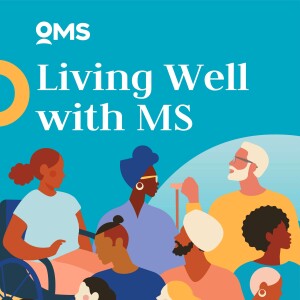
Wednesday May 03, 2023
Wednesday May 03, 2023
Welcome to Season 5 of Living Well with MS, the Overcoming MS podcast where we explore all topics relating to living well with multiple sclerosis (MS). In this episode, we are pleased to welcome internationally renowned mindfulness expert, Professor Craig Hassed. Watch this episode on our YouTube here. Keep reading for the key episode takeaways and Craig's bio. Make sure you sign up to our newsletter to hear our latest tips and news about living a full and happy life with MS. And if you’re new to Overcoming MS, visit our introductory page to find out more about how we support people with MS. Key Takeaways Improving mental health will have an anti-inflammatory effect on the body 2:40: “Improving our mental health and well-being and reducing our stress has an anti-inflammatory effect. High levels of stress, anger, hostility, and poor emotional health have a pro-inflammatory effect. This is very important for an inflammatory based condition, like MS. But also, if there are any symptoms that we're dealing with, the "bothersomeness" of various symptoms seems to be improved through the practice of meditation.” Recordings are very helpful, but the ultimate goal is to meditate unguided 22:13 “It's very useful to get comfortable with knowing the practice, feeling like we're understanding it [and] having guidance for a while. To wean ourselves off [guided meditation], maybe revisit the guided practice every so often, if you feel you need a top up or reminder. But ultimately, you want to be independent, so that you take it anywhere you go.” Visualising our bodies doing specific actions can aid in rehabilitation 40:01 “What happens when we imagine that physical action is that it stimulates the circuits in the brain that are associated with doing that action. If there's a blockage for getting the message through, it keeps knocking on the door, and stimulates either new growth to try and bridge that gap or to find another way of getting the message through. What they found in the research is that people rehabilitate faster, better and get more function back if they have the mental practice, as well as the physical physiotherapy rehabilitation.” Professor Criag Hassed leads a 5-minute meditation at 46:15 Related Links Listen to episode S1E7 Building a Daily Meditation Practice featuring Craig Hassed: https://overcomingms.org/resource/podcast/s1-episode-7 Take Craig’s free Mindfulness courses on Future Learn: Maintaining a Mindful Live: https://www.futurelearn.com/courses/mindfulness-life Mindfulness for Wellbeing and Peak Performance: https://www.futurelearn.com/courses/mindfulness-wellbeing-performance Practice guided meditations from Overcoming MS: https://overcomingms.org/resources/guided-meditation Listen to Geoff’s guided walking meditation on Insight Timer: https://insighttimer.com/geoffallix Don’t miss out Subscribe to this podcast and never miss an episode. You can catch any episode of Living Well with MS here or on your favorite podcast listening app. If you like Living Well with MS, please leave a 5-star review on Apple Podcasts or wherever you tune into the show. Feel free to share your comments and suggestions for future guests and episode topics by emailing podcast@overcomingms.org. Make sure you also sign up to our newsletter to hear our latest tips and news about living a full and happy life with MS. Support us If you enjoy this podcast and want to support the ongoing work of Overcoming MS, you can leave a donation here. Professor Craid Hassed's Bio Craig’s career Professor Craig Hassed OAM has worked with the Faculty of Medicine at Monash University since 1989 but now teaches in many faculties as coordinator of mindfulness programs across Monash and the Director of Education at the Monash Centre for Consciousness and Contemplative Studies (M3CS). His teaching, research and clinical interests include mindfulness, mind-body medicine and lifestyle medicine. Craig has authored 120 papers in peer-reviewed journals and published 14 books and 17 book chapters. He is regularly invited to speak and run courses in his native Australia and overseas in health, educational, government and corporate contexts. He is patron of Meditation Australia, a regular media commentator and co-authored the world’s two leading mindfulness massive open online courses in collaboration with Monash University and FutureLearn. In 2019 Craig was awarded the Medal of the Order of Australia (OAM) for services to Medicine. Craig and Overcoming MS Craig has previously worked with Overcoming MS as a facilitator at Overcoming MS retreats. He also wrote a chapter in the Overcoming MS Handbook on ‘Meditation, mindfulness and the mind-body connection’.
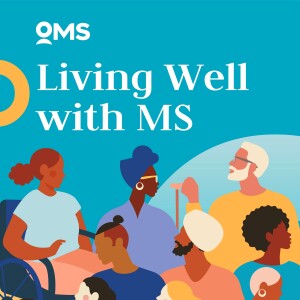
Wednesday Apr 19, 2023
Wednesday Apr 19, 2023
Welcome to Season 5 of Living Well with MS, the Overcoming MS podcast where we explore all topics relating to living well with multiple sclerosis (MS). In this episode, we are pleased to welcome founder of ‘The MS Stage’, Megan Evans. Watch this episode on our YouTube here. Keep reading for the key episode takeaways and Megan's bio. Make sure you sign up to our newsletter to hear our latest tips and news about living a full and happy life with MS. And if you’re new to Overcoming MS, visit our introductory page to find out more about how we support people with MS. Megan's Bio: Megan’s background After a successful career as a Celebrity publicist followed by the founding of her own company, ‘The Well-Coiffed Closet’, Megan Evans led the charge as a personal wardrobe stylist and certified image consultant for over a decade in New York, Los Angeles, and Nashville - all while dealing with her own diagnosis of Multiple Sclerosis at the young age of 24. Megan’s passion for health and wellness Megan has guided her own path of healing by combining alternative medicine with traditional medicine and lots of mindfulness and spiritual practices in between. How ‘The MS Stage’ was created It wasn’t until January of 2022 that Megan connected to her true calling and created tools for herself and other women with MS to truly heal on a deeper level. Having grown up as an actress and modern dancer, Megan always knew that having a creative outlet was one of the most healing tools of all. ‘The MS Stage’ was developed as a different kind of healing support group, one based on Megan’s love of theatre and dance and her own experiences and knowledge learned over her 19-year journey with MS. It brings women from around the world together through dance, improvisational movement, meditation, storytelling, and mindfulness practices to commune with their symptoms, their bodies, and each other in a totally new way. Megan is passionate about helping women with MS feel empowered in mind, body, and spirit. Key Takeaways: Turn your symptoms into superpowers “I literally lead women down this path to turn their symptoms into their superpowers. It becomes really empowering and instead of it becoming a depressing journey with MS it becomes an empowering journey. They learn that MS can actually be a gift in their lives and it can send them down a new path of being really present in their lives and being true to themselves.” Movement can help you get in touch with your emotions “I choose songs for the group, and they move improvisationally. They let their body speak and move through them. Frustration gets to turn into ease, anger gets to turn into love [and] resistance turns into acceptance. It's a beautiful practice and it's really learning to get in touch with their emotions and learning to switch from the negative to the positive.” Positive self-talk is powerful “Our bodies listen and our cells listen, so if we're talking to them positively, giving them encouragement, they want to do well for us ... I have seen it, I've done it for myself and it happens with my students. It's incredible what is possible, because I think there's so much negative self-talk and a lot of anger.” Megan leads a guided meditation practice at 19:29 Related Links: Listeners get a 15% discount on all groups, mention Living Well with MS. Book a discovery call with 'The MS Stage'. Access a free 3-day Meditation Journey on 'The MS Stage' Instagram page. Try a guided meditation from Overcoming MS. Watch the Hope Reborn music video, featuring a dance sequence finale. Don’t miss out: Subscribe to this podcast and never miss an episode. You can catch any episode of Living Well with MS here or on your favorite podcast listening app. If you like Living Well with MS, please leave a 5-star review on Apple Podcasts or wherever you tune into the show. Feel free to share your comments and suggestions for future guests and episode topics by emailing podcast@overcomingms.org. Make sure you also sign up to our newsletter to hear our latest tips and news about living a full and happy life with MS. Support us: If you enjoy this podcast and want to support the ongoing work of Overcoming MS, you can leave a donation here.
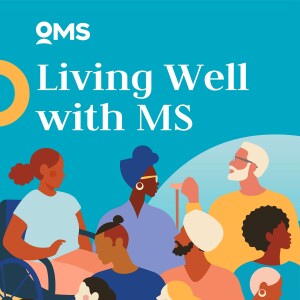
Wednesday Apr 12, 2023
Wednesday Apr 12, 2023
Welcome to Season 5 of Living Well with MS, the Overcoming MS podcast where we explore all topics relating to living well with multiple sclerosis. In this episode, we are sharing the highlights from our ‘Exercising at (or close to) home’ webinar with Overcoming MS Facilitator and qualified yoga teacher, Dr Véronique Gauthier-Simmons. Véronique speaks about the importance of exercise when you’re living with MS and how to make exercise a healthy habit that you’ll enjoy. This webinar was recorded in June 2020 as part of our Refresh with Overcoming MS webinar series. You can watch the whole webinar here or the podcast highlights on YouTube here. Keep reading for the key episode takeaways and Veronique’s bio. Make sure you sign up to our newsletter to hear our latest tips and news about living a full and happy life with multiple sclerosis. And if you’re new to Overcoming MS, visit our introductory page to find out more about how we support people with MS. Véronique’s bio: Véronique has been an Overcoming MS facilitator since the AMEX event in Brighton in 2017 and has since led the exercise sessions at several Overcoming MS retreats. She started yoga when she was diagnosed with relapsing remitting MS in 2000 at the age of 34. At the time, she was lecturing at University College Dublin while completing her PhD thesis. She was a heavy smoker then (though no longer), but also addicted to the gym – especially spinning and step aerobics! Véronique’s yoga qualifications Yoga was so beneficial for her that Véronique decided to become a teacher. She qualified in Hatha yoga (2009) and then in Yoga Therapy (2013). Together with her husband, she created Taming the Walrus, which is dedicated to encouraging people with chronic conditions to practice yoga. They now live in the South of Portugal. Véronique and Overcoming MS Véronique has followed the Overcoming MS Program since 2012 and has found that her health and fitness keep improving. Her exercise regime now also includes weight training, swimming and running. But she’s always open to trying new types of exercise. Key Takeaways: There are many benefits of exercise for people with MS 3:17 “When I was diagnosed 20 years ago, my neurologist advised me that exercise was bad for MS. But, since then, there are loads of studies and research showing it's actually good for us, even if the symptoms come up when you exercise. Exercise is good to maintain and develop muscle strength. This has an impact on your mobility, your posture, [and] on daily activities. Exercise also helps to maintain walking speed and it has been proven that exercise increases your energy level.” If you struggle with fatigue, break your exercise down into manageable short sessions throughout the day 18:45: “If you suffer from fatigue, break it down. In the morning, you could do a two-minute warm-up. There's one very simple warm-up that you can do which is basically moving all your joints, one after the other from the hands to the feet, just moving them around slowly. Then you [could] do five minutes of stretches in the morning. Then later during the day you can do five minutes leg strengthening and core strengthening. Maybe in the afternoon, some upper body strengthening. Then in the evening, I would suggest doing some relaxation. We have to remember that exercise can significantly reduce fatigue levels. It's important to exercise, I think it's important to remember that even 10 minutes makes a difference.” Start slow and go easy on yourself 20:30 “You don't have to run a marathon. Moderate exercise regularly is great. If you can't do 30 minutes, because you are too tired, or because you're in pain, or you've got balance issues, then do 10 minutes. It's better than nothing. And maybe later, you can do another five or 10 minutes to try to break it down, if it's too much in one, go. And remember to adapt to your condition and be flexible. Don't blame yourself [if you can't do as much as you'd like to].” Related Links: Watch the full webinar here Listen to Véronique on S1 Episode 6: The OMS Guide to Getting Fit Try Overcoming MS workouts here Find out more about ‘The Joy of Movement’ by Kelly McGonigal here Listen to the founder of the MS Gym on the Living Well Podcast here Find out more about MS Workouts Find out more about the Johns Hopkins Cooley Center Don’t miss out: Subscribe to this podcast and never miss an episode. You can catch any episode of Living Well with MS here or on your favourite podcast listening app. If you like Living Well with MS, please leave a 5-star review on Apple Podcasts or wherever you tune into the show. Feel free to share your comments and suggestions for future guests and episode topics by emailing podcast@overcomingms.org. Support us: If you enjoy this podcast and want to support the ongoing work of Overcoming MS, you can leave a donation here.
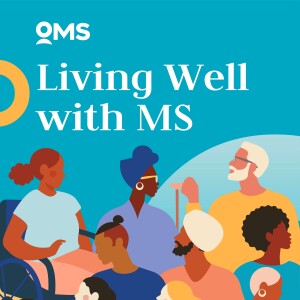
Wednesday Apr 05, 2023
Wednesday Apr 05, 2023
Welcome to Season 5 of Living Well with MS, the Overcoming MS podcast where we explore all topics relating to living well with multiple sclerosis (MS). In this episode, we are pleased to welcome nutrition educators and breathing instructors Annette and Graham Henry! Keep reading for the key episode takeaways and Annette and Graham’s bio. Make sure you sign up to our newsletter to hear our latest tips and news about living a full and happy life with MS. And if you’re new to Overcoming MS, visit our introductory page to find out more about how we support people with MS. Bio: Graham and Annette Henry are the founders of Henry and Henry, Plant-Based Nutrition Educators and Breathing Re-education Instructors. Their health challenges that led them to become experts Both British, they relocated to Germany in October 2020 and now live in Berlin. They have each resolved their own particular health challenges via a dietary approach. For Annette, this was initially endometriosis, and later on chronic fatigue. For Graham, it was obesity, high blood pressure and elevated cholesterol. Their training as whole food plant-based educators Becoming increasingly aware of the impact of diet on our health, Annette and Graham were motivated to learn more about a nutritional approach to managing and resolving chronic conditions, realizing that this would also have knock-on benefits for planetary health. As a result, they both trained as whole food plant-based educators and now apply their knowledge and passion to not only help others transition successfully to a more plant-based diet as a route to improved health but also as a means of contributing to a more conscious and compassionate world. Becoming certified breathing instructors Annette and Graham recognise that the journey of self-realisation and the key to resolving health issues doesn’t always follow an obvious and linear route and that it requires continual revaluation and adaptation. Thus, when one of them self-diagnosed a breathing issue, realising that diet is only one piece of the puzzle, it prompted them to investigate the science of breathing and how the way we breathe can affect our physical and cognitive health. As a result of their findings, they have now become certified breathing instructors, helping clients to resolve and better manage a range of health conditions and to improve performance. Henry and Henry Annette and Graham run regular events, classes and workshops on whole food, plant-based nutrition and breathing. Further details can be found on their website at https://www.henryandhenryeu.com Key Takeaways: Prebiotics, probiotics and postbiotics “Prebiotics are the fibres that we eat, that we can't actually do anything with, but our gut bacteria can. That's their food and that’s what they thrive on. Probiotics are the healthy gut bugs that we have. So, the prebiotics are for the probiotics (our gut bugs). Then the postbiotics are the byproducts of that nutrition, that the bugs eat, [and] that release all sorts of wonderful chemicals in our body - short-chain fatty acids – which we now know, have so many health benefits. How to transition to a plant-based diet “I would say that taking smallest steps is better for most people, because they can handle that better. It may be a case of changing one meal, making sure your breakfast is plant-based every day or a different meal or whatever [meal you choose], and increasing it [and] looking at swaps.” Breathing for health “The Buteyko Breathing Method is really for dealing with health conditions. If you're breathing incorrectly, then somewhere in your health, things will not work quite as well as they could. It could be more obvious things such as asthma and anxiety. Sleep can be extremely impacted by [breathing incorrectly], as I'm finding out and it’s just starting to get exciting because I am actually finally sleeping a little bit better. [There] are all sorts of other areas too, that you might not imagine, [for example] your posture is impacted by your breathing.” Related links: Henry and Henry is an Affiliate Organization of Plant Based Health Professionals UK Salus Fatigue Foundation is a non-profit organization which inspires people affected by fatigue to live happy and healthy lives. Listen to Living Well with MS Coffee Break #21 with Friends Reunited cofounder Julie Pankhurst Reach James Nestor’s book Breath Learn about Buteyko Breathing Don’t miss out: Subscribe to this podcast and never miss an episode. You can catch any episode of Living Well with MS here or on your favourite podcast listening app. If you like Living Well with MS, please leave a 5-star review on Apple Podcasts or wherever you tune into the show. Feel free to share your comments and suggestions for future guests and episode topics by emailing podcast@overcomingms.org. Support us: If you enjoy this podcast and want to support the ongoing work of Overcoming MS, you can leave a donation here.
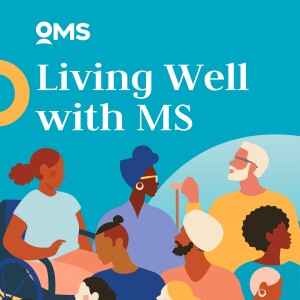
Wednesday Mar 15, 2023
Wednesday Mar 15, 2023
Welcome to Season 5 of Living Well with MS, the Overcoming MS podcast where we explore all topics relating to living well with multiple sclerosis (MS). In this episode we are pleased to welcome professional cook and writer, Jack McNulty as our guest! You can submit your questions for Jack anytime by emailing podcast@overcomingms.org. Keep reading for the key episode takeaways and Jack’s bio. Make sure you sign up to our newsletter to hear our latest tips and news about living a full and happy life with multiple sclerosis. And if you’re new to Overcoming MS, visit our introductory page to find out more about how we support people with MS. Bio Jack’s career Jack McNulty has been involved in food and cooking most of his life. He’s walked many paths during his culinary journey, including transforming himself from an interested home cook to a professional chef with classical training. He has worked for talented and knowledgeable chefs in high-end restaurants in Switzerland, Italy, and France. Jack operated his own catering business and cooking school for 15 years, while also finding time to write about cooking. Jack’s current activities include operating myfreshattitude.com – a website dedicated to providing healthy vegan recipes and useful vegan cooking instruction and techniques. He also writes and distributes a weekly international newsletter – VeganWeekly – to inspire people to cook healthy vegan food. Jack and Overcoming MS Jack has followed the Overcoming MS lifestyle since 2009. He has actively worked on providing recipes and information to the Overcoming MS website, was the contributing editor to the Overcoming MS Cookbook, and authored the ‘Eat Well’ chapter in the latest Overcoming Multiple Sclerosis Handbook. Key Takeaways The Overcoming MS diet will help manage inflammation “If you look at it just purely on the dietary portion of the Overcoming MS program, if you follow the guidelines, it gives you a good chance of - over time - getting back to some sort of base level. And that may take somewhere between five and seven years for a lot of people. I know it did for me, it was around seven years before all my symptoms just vanished. The goal is to promote health in your body. So, [if] you want to decrease inflammation, you want to ingest foods that are going to play a role in decreasing inflammation.” It’s helpful to research restaurant menus ahead of dining out “If I'm going to a place I've not been, I turn to the internet first to see if there is a menu online. Maybe by looking online, you're just already going to say, ‘well there's only one thing I can have on this menu’ and that might not be good enough. But it's also possible that there are some possibilities here and you have some questions already in mind before you even get to the restaurant that you could ask the server.” Don’t stress if you eat something by accident/not by choice when eating out “Over the years, having an experience like that [eating something by accident/not by choice when eating out] is not going to have a huge impact. Now, having said that, I think it's probably not a good idea to just say, well, it's accepted because Jack just said so. I'm not saying that at all. I'm just saying that sometimes those things come up and it's better to just not stress about them and then just go ahead and enjoy it and move on. And next day, be twice as healthy.” Make sure you sign up to our newsletter to hear our latest tips and news about living a full and happy life with MS. Related Links: Read the Overcoming MS Handbook Download the Overcoming MS Chef cards Listen to previous “Ask Jack” episodes S3E34, S3E35, S3E38, S3E41, E3E48, S4E51, S4E53, S4E65 Don’t miss out: Subscribe to this podcast and never miss an episode. You can catch any episode of Living Well with MS here or on your favourite podcast listening app. If you like Living Well with MS, please leave a 5-star review on Apple Podcasts or wherever you tune into the show. Feel free to share your comments and suggestions for future guests and episode topics by emailing podcast@overcomingms.org. Support us: If you enjoy this podcast and want to support the ongoing work of Overcoming MS, you can leave a donation here.
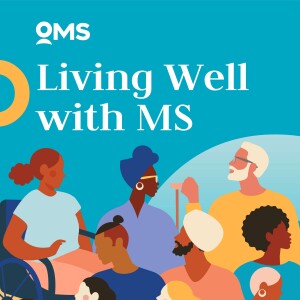
Wednesday Mar 08, 2023
Wednesday Mar 08, 2023
Welcome to Season 5 of Living Well with MS, the Overcoming MS podcast where we explore all topics relating to living well with multiple sclerosis (MS). In this episode, we are sharing the highlights from our ‘Family friendly Foods’ webinar with Nutritional Therapist Sam Josephs. In this episode, Sam shares how to incorporate easy, family-friendly Overcoming MS recipe ideas into your everyday life and social gatherings. This webinar was recorded in June 2022 as part of our Finding Hope with Overcoming MS webinar series. You can watch the whole webinar here or the podcast highlights on YouTube here. Keep reading for the key episode takeaways and Sam’s bio. Make sure you sign up to our newsletter to hear our latest tips and news about living a full and happy life with multiple sclerosis. And if you’re new to Overcoming MS, visit our introductory page to find out more about how we support people with MS. Bio: Sam Josephs believes passionately in diet and lifestyle intervention as a powerful preventative approach to all chronic health conditions, including MS. Sam’s qualifications and career Since graduating from BCNH (UK College of Nutrition and Health) in 2008, Sam has been working in her North London clinic seeing clients on a 1-2-1 basis. She has also worked as a pastoral and clinical tutor for BCNH, and appears annually as a guest lecturer at both BCNH and the Institute of Optimum Nutrition, training upcoming nutritional therapy students in a variety of conditions, including MS. She has presented to many MS support groups, was an expert panelist at the MSLife Expo in 2016 and has worked as a retreat facilitator for Overcoming Multiple Sclerosis. She is a fully qualified Nutritional Therapist, a full member of the British Association for Nutrition and Lifestyle Medicine (BANT) and is also registered with the Complementary and Natural Healthcare Council (CNHC) – the only register for Nutritional Therapy recognized by the Department of Health. Sam’s personal life Her husband was diagnosed with Multiple Sclerosis in 2002 which has shaped the direction of Sam’s career and gives her the compassion and unique hands-on knowledge to support so many others with the condition. Above all else, Sam enjoys nothing more than a trip to the Farmer’s Market, or a good greengrocer and is a keen and experimental cook for her family and friends. Key Takeaways: Making your own veggie burgers is easier than you think “A lot of store-bought meat substitutes contain a long list of ingredients or the cheap oils like palm oil. But they are pretty easy to make yourself. Essentially all you're doing is rinsing a can of beans, adding some dried oats, or some leftover cooked rice from the day before, or a chunk of bread which you can toast if it's maybe a bit stale and blitz it up into breadcrumbs. Maybe add an egg white, and then just put loads of herbs and seasonings and flavors in it. And if you just mix it all up together in a blender, then it will make some really nice patties.” Healthy snack dips are easy and delicious “Dips are a great thing to have in the fridge for sandwich breads, picnics, but also when the kids get home from school. Rather than KitKats and crisps, they could just grab a carrot and stick it into a nice dip. It's essentially just using a dollop of soy yogurt, either blended up with a tin of fish (smoked mackerel works really well) or a tin of beans and blitz it all up together with a handheld mixer, and presto, it's a dip!” Children take family eating habits with them into adulthood “If we make those changes, and we set them in stone at home in the family, when the kids grow up and live alone, and go off to college or get [their] first job, [they’ll take those healthy habits with them.] So switch things like white bread to brown, try to switch white rice to brown or whole grain cereals, switch out from something like Frosties every day, to having porridge once a week, or a nice muesli once a week, just changing the routine [can make a difference for them].” Related Links: Listen to Sam’s previous episodes of Living Well with MS: o S1 Episode 3: The OMS Diet in a Nutshell (Part 1) o S1 Episode 4: The OMS Diet in a Nutshell (Part 2) Watch the original Webinar recording here Don’t miss out: Subscribe to this podcast and never miss an episode. You can catch any episode of Living Well with MS here or on your favourite podcast listening app. If you like Living Well with MS, please leave a 5-star review on Apple Podcasts or wherever you tune into the show. Feel free to share your comments and suggestions for future guests and episode topics by emailing podcast@overcomingms.org. Make sure you sign up to our newsletter to hear our latest tips and news about living a full and happy life with MS. Support us If you enjoy this podcast and want to support the ongoing work of Overcoming MS, you can leave a donation here.




